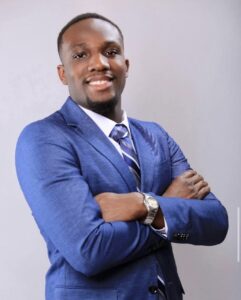
The only concerns a high school student should have are preparing for prom, grad bash, homecoming dances and, most importantly, getting ready to go off to college.
James Oyetunji wasn’t so fortunate. His chief concern was homelessness, which started when the Miami native was a sophomore in high school.
Traumatic experiences at home resulted in Oyetunji becoming homeless and forced him to have to live with other family members.
When asked how he was able to overcome such adversity, his response was: “I always had high hopes along the process of trying to reach my goals. The courage was simply within me to rise above everything.”
In middle school Oyetunji found himself feeling isolated from others. He read a lot as a substitute source of engagement. In high school, he matriculated in advanced placement courses and dual enrollment classes.
Although he did well, attending Florida A&M University — let alone any university — was not something that he envisioned for himself.
Thankfully, others were able to see the potential in Oyetunji’s future and gave him the push to enroll. After meeting with his guidance counselor, Oyetunji was able to join the Dorothy Henderson Scholars Program at FAMU – which currently supports 150 FAMU students. It provided him with housing, food and a laptop — amenities that Oyetunji could call his own for the first time in a very long time.
“I wanted to live a better lifestyle. And I knew that it had to be by going to college to try to get myself to that next level,” Oyetunji said.
After the conclusion of spring and fall semesters, students always have the option to go home or to take summer classes and remain on campus until that two six-week sessions are over. After completing his summer classes, Oyetunji had nowhere to go. On holidays and breaks such as Christmas, FAMU’s campus became Oyetunji’s home.
While making his way through his undergrad career, the Dorothy Henderson Scholars Program along with grants and support from the community enabled Oyetunji to sustain a life that eventually allowed him to be able to earn a bachelor’s degree in criminal justice. He’s now working on a master’s in public administration, and he wants to pursue a doctorate in conflict resolution at Nova University.
Unfortunately, Oyetunji is not the first or last college student to experience homelessness while attending college.
According to edweek.org, 1.5 million students were homeless during the 2017-18 school year, which was 11 percent more than the previous year and nearly double the number a decade ago, based on federal data. The Hope Center at Temple University reports that roughly 60 percent of community college students and 48 percent of four-year college students have faced homelessness.
When asked how many students who attend FAMU are homeless, Kimberly Ceaser, a case manager and program coordinator for the Dorothy Henderson Scholars Program, said: “You can’t really define a number because a lot of students are just afraid or feel embarrassed to actually come forward and talk about these types of things.”
Oyetunji believes that awareness of students like him who have been homeless in college should start in high school.
“This issue should be noted upon more in high school because you have a lot of people that, back then like myself, aren’t aware that every single college in America offers [programs] for students. But a lot of people are not aware because high school counselors per se do not relay this to the student that is homeless,” he said.
For Oyetunji, his history of facing housing insecurities certainly does not control his narrative or define who he can become. He said he relies on his story to help others.
“I had a very hard lifestyle so looking now where I am, my story may encourage other Black males, or anybody else to come forward,” Oyetunji said.